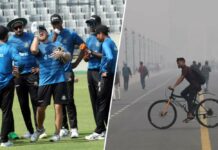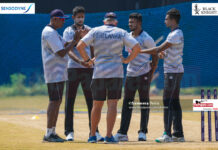The chief executive of cricket’s governing body believes it will be tough for anyone outside the game to fix matches during next month’s 50-over World Cup in Australia and New Zealand.
David Richardson also said on Tuesday that the International Cricket Council (ICC) would clamp down hard on bad behaviour in the tournament by the players.
There have been several cases of corruption in the sport in recent years.
Pakistan have been hit the hardest with former captain Salman Butt, pacemen Mohammad Amir and Mohammad Asif and leg-spinner Danish Kaneria all banned for fixing in the last four and a half years.
“On the corruption side it’s safe to say we’re the best prepared we’ve ever been,” Richardson said in an ICC interview.
“Our anti-corruption personnel have done a lot of work in entering into agreements, associations and arrangements with the local police and law enforcement agencies in New Zealand and Australia.
“Our intelligence and information on who these corruptors are, and who may try and fix matches around the world, has grown. We know exactly where these people are and we have got a list of more than a hundred names we will be passing on to these law enforcement agencies,” added Richardson.
“It will be very difficult for anybody outside of the game to come and even attempt to try and corrupt players, umpires or anybody involved in the World Cup, to try and fix a match.”
The former South Africa wicketkeeper-batsman, who played in the World Cup the last time it was hosted by Australia and New Zealand in 1992, said match-fixing or trying to rig games was now regarded as a criminal offence by the two host nations.
“This enables not only us but the police themselves to take much more specific and direct action against these people who are trying to corrupt the game,” explained Richardson.
The 55-year-old also addressed the issue of poor on-field conduct.
“There have been too many examples of player behaviour going too far and overstepping the boundaries of acceptabilities,” said Richardson. “The amount of sledging and disrespect shown by players to each other was bad.
“We have done a lot of work with our umpires and match referees to ensure they are much more pro-active in terms of policing behaviour on the field and when players do over-step the mark, taking appropriate action.”













